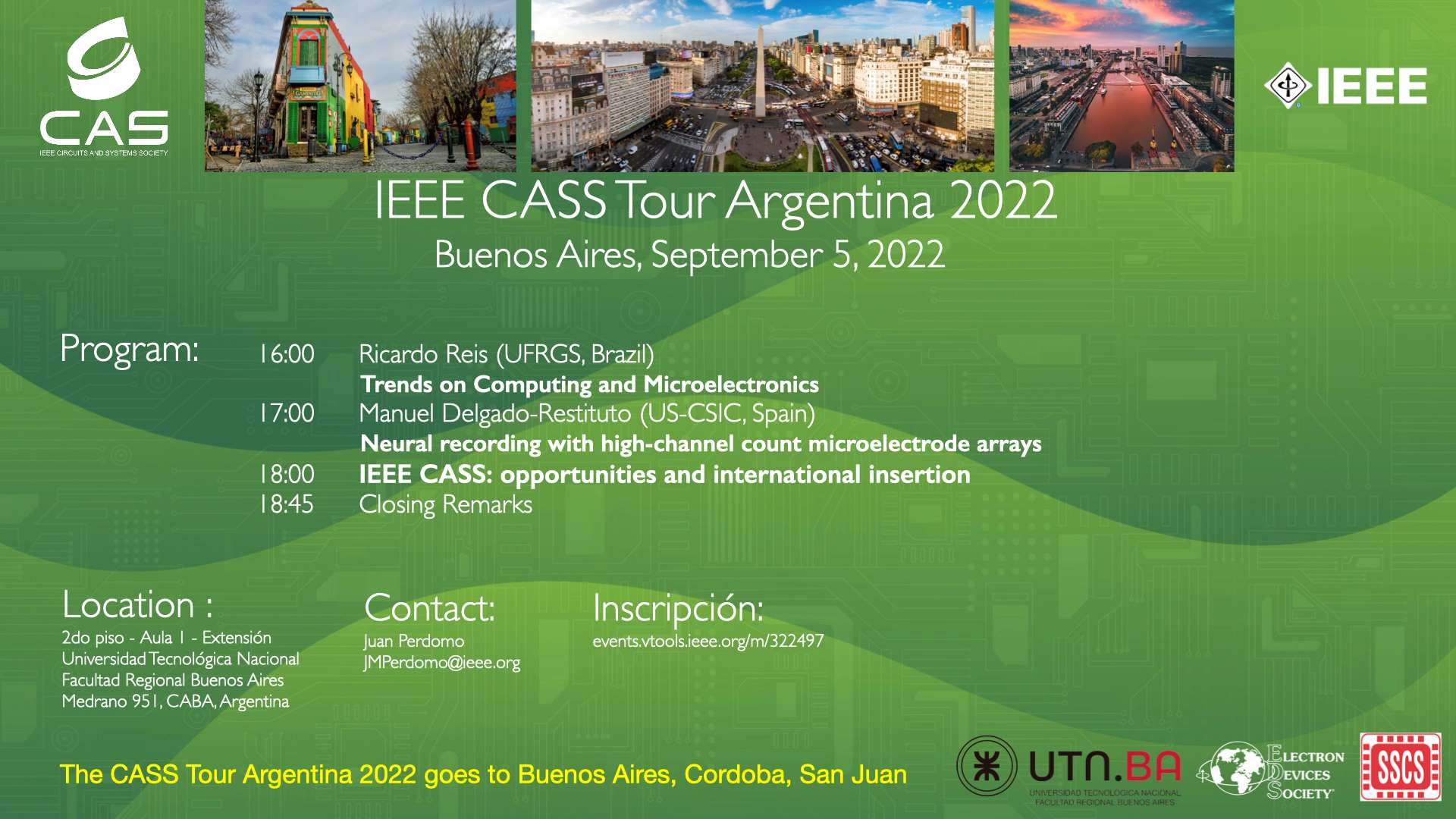IEEE CASS Tour Argentina 2022 - Buenos Aires

Date and Time
Location
Hosts
Registration
-
 Add Event to Calendar
Add Event to Calendar
- Universidad Tecnológica Nacional Facultad Regional Buenos Aires
- Medrano 951
- CABA, Distrito Federal
- Argentina
- Room Number: 2do piso - Aula 1 - Extensión
- Contact Event Hosts
- Co-sponsored by Universidad Tecnológica Nacional Facultad Regional Buenos aires - Departamento de Ingeniería Electrónica
Speakers
Dr. Ricardo Reis
Trends on Micro and Nanoelectronics
Biography:
Ricardo Reis es Licenciado en Ingeniería Eléctronica por la Universidad Federal de Rio Grande do Sul (UFRGS), Porto Alegre, Brasil (1978). Tiene un doctorado en Informática, opción Microelectrónica, del Instituto Politécnico Nacional de Grenoble (INPG), Francia (1983). Doctor Honoris Causa por la Universidad de Montpellier en 2016. Es profesor del Instituto de Informática de la UFRGS. Sus principales temas de investigación incluyen la automatización del diseño físico de chips, metodologías de diseño y diseños para sistemas tolerantes a fallas y de baja potencia. Cuenta con más de 750 publicaciones, entre libros, revistas y actas de congresos. Fue vicepresidente de la IFIP (Federación Internacional de Procesamiento de la Información) y también presidente de la Sociedad Brasileña de Informática (dos mandatos) y vicepresidente de la Sociedad Brasileña de Microelectrónica. Es miembro sénior de IEEE CASS y recibió el "2015 IEEE CASS Meririous Service Award" de 2015. Fue vicepresidente de IEEE CASS durante dos mandatos (2008/2011). Es el fundador del Capítulo CASS de Rio Grande do Sul, que ganó el Premio CASS al Capítulo Mundial del Año 2011, 2012, 2018 y 2022, y el Capítulo del Año de R9 en 2013, 2014, 2016, 2017 y 2020. Uno de los fundadores de varias conferencias como SBCCI y LASCAS, la Conferencia Flagship CASS en la Región 9. Fue el Coordinador General o de Programa de varias conferencias como IEEE ISVLSI, SBCCI, IFIP VLSI-SoC, ICECS, PATMOS. Ricardo fue presidente del Comité Directivo del IFIP/IEEE VLSI-SoC. Es Vicepresidente de IFIP WG10.5 y fue Presidente de IFIP TC10. También fue el fundador de EMicro. En 2002, recibió el Premio Investigador del Año del Estado de Rio Grande do Sul. Es miembro fundador de la SBC (Sociedad Brasileña de Computación) y también miembro fundador de SBMicro (Sociedad Brasileña de Microelectrónica). Fue miembro del Programa CASS DLP (2014/2015), y ha impartido más de 80 ponencias invitadas en congresos internacionales. Miembro de IEEE CASS BoG y IEEE CEDA BoG. Miembro del Comité Coordinador de la IoT Initiative de IEEE. Coordinador del SiG de IoT de la CASS. Reis recibió el premio IFIP Fellow Award en 2021 y el premio ACM/ISPD Lifetime Achievement Award en 2022.
Dr. Manuel Delgado-Restituto
Neural recording with high-channel count microelectrode array
One of the biggest challenges in neurophysiology is to identify the effective connectivity within the brain and reveal the subjacent drive-response map of the neural system. This could help to understand the functional mechanisms underlying many neurological disorders that currently do not have effective treatments, or unravel the neural network involved in specific tasks, including sensory responses, motor activities, or intellectual or emotional processes, to implement efficient Brain-Machine Interfaces (BMIs). Neural recording systems based on CMOS technology, in combination with microelectrode arrays, can achieve very high temporal and spatial resolution and have been proved useful for assessing connectivity at the extracellular single-unit level. However, the suitability of these devices for complex tasks as, for instance, the restoration or rehabilitation of lost sensory, motor or autonomic functions after injury or disease, ultimately depends on the amount and quality of the information that can be extracted from the brain tissue and, accordingly, it is crucial to increase the number of neural signals which can be accurately and simultaneously recorded in vivo.
A major bottleneck in implementing recording systems for large neural populations arises from difficulties in achieving the low noise and low power requirements of the active readout circuit, with the need to reduce silicon occupancy and increase recording density to keep the form factor of the neuro-prosthesis low. This essential trade-off, as well as other fundamental limits, will be explored in this seminar. Different intracortical electrode arrangements will be considered, some of the current trends to address high channel count recordings will be discussed, and strategies to improve performance will be pointed out.
Biography:
Manuel Delgado-Restituto received the Ph.D. degree in Electronic Physics (Honors) from the University of Seville, Spain, in 1996. Since then, he has been working with the Institute of Microelectronics of Seville (IMSE-Univ. of Sevilla) where he currently heads a research group on low-power medical microelectronics and works in the design of silicon and optoelectronic microsystems for understanding biological neural systems, the development of neural prostheses and brain-machine interfaces, the implementation of wireless body area network transceivers and the realization of RFID transponders with biomedical sensing capabilities.
Manuel served as an Associate Editor for different IEEE Publications (TCAS-I, TCAS-II and TBioCAS) and as Editor-in-Chief for the IEEE JOURNAL on EMERGING AND SELECTED TOPICS IN CIRCUITS AND SYSTEMS (JETCAS). He also served as Vice President for Publications and President-Elect of the IEEE Circuits and Systems Society and now is serving as President of this Society. He has also served (or is serving) in the Organizing Committee of different international conferences, including his role as General Co-Chair for ISCAS 2020 and as Technical Program Co-Chair of ISCAS 2022.

